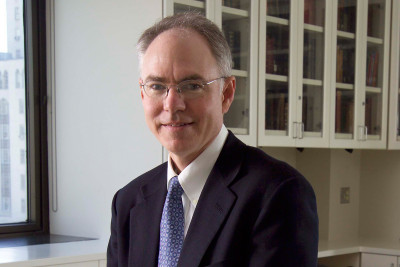
Charles L. Sawyers, MD -- Chair, Human Oncology and Pathogenesis Program Investigator, Howard Hughes Medical Institute
Memorial Sloan Kettering Cancer Center (MSKCC) physician-scientist Charles L. Sawyers has been named a recipient of the 2009 Lasker~DeBakey Award for Clinical Medical Research. Dr. Sawyers is Chair of the Human Oncology and Pathogenesis Program (HOPP) within Memorial Hospital and a member of the Leukemia Service.
Dr. Sawyers is being recognized for his part in advancing treatments for chronic myeloid leukemia (CML), a relatively rare disease that strikes about 5,000 people per year in the United States. He played a key role in the development of imatinib (Gleevec®) and dasatinib (Sprycel™), two drugs that together have transformed CML from a fatal cancer into one that is nearly always treatable. Imatinib was approved by the US Food and Drug Administration in 2001, and dasatinib was approved in 2006.
Imatinib was one of the first targeted therapies developed for cancer. It blocks the activity of the BCR-ABL protein, a signaling molecule that promotes the continuous growth and proliferation of CML cells. The protein is encoded by a gene that results when pieces of two chromosomes, 9 and 22, break off and trade places, resulting in what is known as the Philadelphia chromosome. Unlike traditional chemotherapy, which kills healthy as well as cancerous cells, imatinib is targeted specifically toward cancer cells; therefore the drug has few side effects.
Using his clinical understanding of treating CML as well his expertise from studying it in the laboratory, Dr. Sawyers helped design the first clinical trial for imatinib, including selecting which patients were most likely to benefit from the drug. Along with Brian J. Druker of Oregon Health and Science University and Moshe Talpaz of The University of Texas M.D. Anderson Cancer Center, he was the first to give imatinib to CML patients, and a dramatic improvement in outcomes was seen in this first study.
As patients spent more time on imatinib, however, many of them began to develop resistance to the drug and to relapse. Dr. Sawyers found that mutations in BCR-ABL were the cause of the relapses. That resistance to a targeted drug is based on mutations in the drug target was a key discovery. It established a pattern since seen in other diseases treated with imatinib, as well as in the resistance patients may develop to targeted drugs used to treat other cancers, including some forms of lung cancer.
“Charles has been a critical player in all phases of recent dramatic progress against CML, especially in the development of second-generation BCR-ABL inhibitors,” said MSKCC President Harold Varmus. “His work demonstrates that if you understand the molecular causes of secondary resistance to a so-called targeted therapy, you can devise rational strategies to overcome it. This has important implications not only for the treatment of CML but for the treatment of other cancers.”
Dr. Sawyers collaborated with structural biologist John Kuriyan, now at the University of California, Berkeley, to understand how the mutations prevented imatinib from binding the BCR-ABL structure.
Kuriyan’s team had discovered that the drug was able to block the protein’s activity only when the protein was in what is known as the “closed” conformation. Many of the resistance mutations caused BCR-ABL to be in the “open” conformation, preventing imatinib from binding. This provided an important clue toward finding a second-generation inhibitor.
In collaboration with researchers from Bristol-Myers Squibb, Dr. Sawyers’ team then developed the drug dasatinib to block BCR-ABL in CML cells that were imatinib resistant. He and Dr. Talpaz designed and led the first patient trials for dasatinib, which, like those for imatinib, were highly positive from the beginning. Today dasatinib and another drug, nilotinib (Tasigna®), are standard treatment for CML patients who develop resistance to initial treatment with imatinib.
“I had feelings of shock, joy, surprise, and delight when I learned I would be receiving this award,” said Dr. Sawyers. “The satisfaction of knowing that your work has contributed to the lives of thousands of CML patients is impossible to put into words. I am grateful to all the patients who volunteered, allowing us to test our hypothesis, and I thank them and their families for their courage and inspiration.”
“The Lasker is fit tribute to Charles and his colleagues, who have established the principle that small molecules targeted to pathogenetic mutations can interfere selectively with the growth and survival of cancer cells,” added MSKCC Physician-in-Chief Robert E. Wittes. “Charles has also been instrumental in demonstrating that resistance to these same drugs can be understood in molecular terms and circumvented. This work has provided the strongest possible impetus to further research in cancer-related molecular therapeutics.”
Dr. Sawyers came to MSKCC in 2006 as the inaugural Chair of HOPP after nearly two decades at the University of California, Los Angeles, where his research with imatinib and dasatinib was carried out. He earned his MD degree at the Johns Hopkins University School of Medicine and completed his training at the University of California, San Francisco, and at UCLA. He holds the Marie-Josée and Henry R. Kravis Chair at MSKCC and is a Howard Hughes Medical Institute investigator.
The Lasker~DeBakey Clinical Medical Research Award, one of four presented by the Albert and Mary Lasker Foundation, honors investigators whose contributions have improved the clinical treatment of patients. Previously known as the Albert Lasker Clinical Medical Research Award, it was renamed last year in honor of world-renowned cardiac surgeon Michael E. DeBakey. Dr. Sawyers’ co-recipients of the award are Dr. Druker and Nicholas B. Lydon, formerly a scientist at Novartis, which developed imatinib. Often called “America’s Nobels,” the Lasker Awards have recognized the contributions of scientists, physicians, and public servants since 1945.
